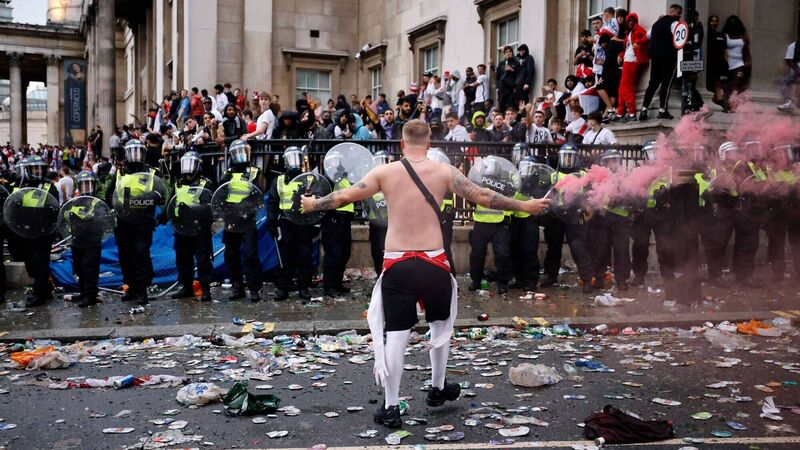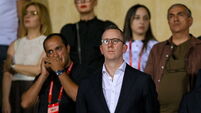Colin Sheridan: Hope never turned to hopelessness so quickly as during Euro 2020 final at Wembley

An England fan waves a smoke bomb in front of a line of police officers monitoring England supporters standing on the edge of Trafalgar Square during a live screening of the Euro 2020 final between England and Italy in central London.
If grief is the thing with feathers, then hope is a firecracker up your arse. In England at any rate.
We should all count ourselves lucky that my beloved Mayo do not react to reaching major finals in the same manner as the revellers in Trafalgar Square did last Sunday evening. There’d be more backsides from Ballyhaunis orbiting the earth than Chinese satellites. The Gresham would be ground zero, the Big Tree a bloodied morass, as distant cousins from Foxford and Fingal go toe to toe, armed to the gills with broken pint glasses and no trousers. There but for the grace of God go all of us.
I always regarded hope as a dangerous thing, but more in the existential sense. The phrase “it’s the hope that kills you”, one which I have received by text in the immediate aftermath of many lost All-Ireland finals, was one I understood to be figurative, not literal. I never imagined hope would actually endanger someone's life, the same way I never imagined I’d see a grown man shove explosive ordnance up an orifice in an act of apparent patriotic jubilation, all in the name of Queen and country, as a broken nation united together in supporting its national football team. That “support” manifested itself in scenes that began as Twitter fodder, cringeworthy and loutish, before reaching a crescendo of unbridled thuggery.
Hope, it seemed, had never turned to hopelessness quite so quickly (and again, I’m from Mayo) as it did in London last Sunday night. Usually, hopelessness - or despair - comes after the result. Usually, but long before a ball was kicked at Wembley, pint glasses fell from the sky like mortars at Bastogne. There was enough damage done pre-kickoff to ensure that, had England actually won the damn thing, any collective joy would’ve been tempered by events both in the stadium and around the city. However they might come to spin it later, this Medusa had transformed from flaxen-haired goddess to a snake-haired sea hag in the space of a few hours. The hate, suppressed for one glorious month, poured forth like septic puss. If football was the suture, it burst.
The audacity of England's hope was not in its idealism but its arrogance, not that they were the best collection of footballers at the tournament - this could only be proved on the field - but that winning somehow served as an allegory for the healing of a great nation. Danny Boyle, in directing the 2012 Olympic opening ceremony, produced something so gloriously daft, he captured a vision of England that was at once classically bumptious and self deprecatingly inclusive. The closing ceremony of this Euros was like a Jerry Bruckheimer blockbuster directed by Lars Von Trier. This was the Purge on crack cocaine.
Incredibly, at every turn, the team remained on the right side of history. Pre-tournament, when the players and their manager Gareth Southgate spoke with unequivocal clarity on their collective stance on the taking of the knee in the teeth of a chorus of boos from their supporters, they lay down a marker that they never stepped back from.
On the field, despite never quite playing as well as their talent suggested they could, they handled the pressure and kept their side of the bargain. They delivered on their promise of a home tournament final, their first of any description since 1966. Luck, for once, seemed on their side. They happened upon the right side of the draw, but, when has that ever stopped an England team gloriously imploding and inspiring a continent-wide outpouring of schadenfreude?
Speaking of which, revelling in the incompetence of others has not exactly served us - Ireland - well as a country recently. We tried it with Brexit and we tried it with Covid-19 and both times we’ve been left looking a little more stupid than before.
Nor are we paragons of virtue when it comes to public displays of decorum. One hot summer day in Salthill is enough to inspire a literal meltdown of societal norms. Roundhouse kicking waiters only become cult heroes if the society you live in demands it. Yes, schadenfreude is a slippery mask to hide behind.
Yet, for all our failings, sport has never been the catalyst for chaos it clearly is in England, and even there, it is not “sport” that lights the touch paper, but football. Not rugby league, or union or glorious Goodwood or Henman Hill.
Not the cheese rolling in the Cotswolds, either. Just association football.
Which is funny, because the long-held trope thrown at the overpaid, over-indulged practitioners of the game - the professional footballers themselves - is that they are out of touch with reality because of the aloof status that their success in “making it” grants them. My guess is that they are indeed out of touch, as I’m sure they were as mystified as any foreigner as to what the hell was happening on the streets last Sunday night. That was not about football, but more a tumour exploding. I’ve seen uprisings executed with more etiquette.
As a casual observer, I did not want England to win the Euros the same way I never wanted Galway footballers to win anything. I’m a simple man; I like the meme of the Italian coaches showing the Ipads to their player pitchside, and the joke being they were viewing genuine Italian leather loafers online. But, on some deeper level, I didn’t want Rashford or Sancho or Saka to miss, either.
As each second of their long walk to the penalty spot ticked painfully by, the profundity of the moment became increasingly amplified. Scoring would not have quenched the flames of the moronic inferno already raging around them, but it may have contained it. That they missed is almost irrelevant. Their reputations as admirable men secure, it is not on them the soul of the country they represent is slowly bleeding out. You can pick your metaphor for England right now, and watch it become a reality.
There but for the grace of God...



